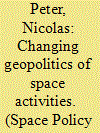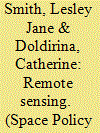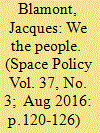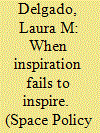|
|
|
Sort Order |
|
|
|
Items / Page
|
|
|
|
|
|
|
| Srl | Item |
| 1 |
ID:
157186


|
|
|
|
|
| Summary/Abstract |
The first, heroic age of space exploration was driven by national rivalry between the USA and USSR. There have indeed been recent achievements, but as the Cold War ends the superpowers are turning their attention to domestic Issues and the prospect looms of a prolonged hiatus In apace exploration. The only way forward Is through International cooperation, but this will never happen without a serious Investment of political will. A well-planned, long-term strategy for the exploration of Mars could provide the necessary focus.
|
|
|
|
|
|
|
|
|
|
|
|
|
|
|
|
| 2 |
ID:
157181


|
|
|
|
|
| Summary/Abstract |
Traditional space relations among civilian space actors are undergoing in the post-cold war era a rapid evolution with a growing number of new institutional entities. The cold war era and its resulting political environment, which limited space cooperation to ‘intra-bloc’ cooperation has disappeared, allowing the development of new axes and mechanisms of cooperation. The internationalization and regionalization of space activities witnessed in recent years is foreseen to gain momentum, leading therefore to a new geography of civilian space activities.
|
|
|
|
|
|
|
|
|
|
|
|
|
|
|
|
| 3 |
ID:
157184


|
|
|
|
|
| Summary/Abstract |
The political and economic climate in China has changed often and wildly since the country's space programme was founded. Nevertheless the programme has remained remarkably stable and achieved major successes. This article traces the programme's history in the context of the four major periods through which it has lived and offers an explanation of why and how it has survived so well: high-level government support, international prestige and committed personnel. The recent Tiananmen turmoil has not dimmed its progress and the programme looks set both to advance its space commercialization efforts in the short term and to develop a manned capability in the long term.
|
|
|
|
|
|
|
|
|
|
|
|
|
|
|
|
| 4 |
ID:
157179


|
|
|
|
|
| Summary/Abstract |
The National Aeronautics and Space Administration (NASA)—as the global leader in all areas of spaceflight and space science— is a unique organization in terms of size, mission, constraints, complexity and motivations. NASA's flagship endeavor—human spaceflight—is extremely risky and one of the most complicated tasks undertaken by man. It is well accepted that the tragic destruction of the Space Shuttle Challenger on 28 January 1986 was the result of organizational failure. The surprising disintegration of the Space Shuttle Columbia in February 2003—nearly 17 years to the day after Challenger—was a shocking reminder of how seemingly innocuous details play important roles in risky systems and organizations. NASA as an organization has changed considerably over the 42 years of its existence. If it is serious about minimizing failure and promoting its mission, perhaps the most intense period of organizational change lies in its immediate future. This paper outlines some of the critical features of NASA's organization and organizational change, namely path dependence and “normalization of deviance”. Subsequently, it reviews the rationale behind calling the Challenger tragedy an organizational failure. Finally, it argues that the recent Columbia accident displays characteristics of organizational failure and proposes recommendations for the future.
|
|
|
|
|
|
|
|
|
|
|
|
|
|
|
|
| 5 |
ID:
157182


|
|
|
|
|
| Summary/Abstract |
Satellite services benefit civil society by helping tackle challenges such as climate change, the digital divide, etc. They have the potential to deliver concrete benefits to European society through innovative services supporting economic, societal and environmental policies. Such benefits can trigger increased public support for space in Europe. However, this potential has yet to be achieved. This paper argues that technological bias, the diversity of interests and initiatives among stakeholders and their individual actions do not always serve their collective objective to ensure wide diffusion of satellite services. It draws on theories of diffusion of innovation and on its authors' participatory work with the space and the user communities and at their interface in an effort to help diffuse satellite services within civil society. One of the major causes of insufficient service diffusion is the weakness of the interface between the space and user communities; some of factors that currently contribute to this state of affairs are the space community's over-reliance on publicly financed, technical demonstration projects as solutions to service diffusion; insufficient coordination by public authorities of innovation policies and programmes with other public policies and objectives; and an insufficient integration of satellite services within users' culture, traditional tools and services. The discussion allows for conclusions to be drawn on how the system of stakeholders could function better in order for satellite services to be successfully diffused in Europe.
|
|
|
|
|
|
|
|
|
|
|
|
|
|
|
|
| 6 |
ID:
157185


|
|
|
|
|
| Summary/Abstract |
While the need for adequate space law may be as urgent as ever, the international community has discovered that today it is increasingly difficult to reach consensus on statutes to govern new space activities. In view of the noticeable slowdown in the law-making process, serious discussions about the most suitable and effective techniques of space legislation are required. The author discusses the political and legal problems of making laws to deal with space and space activities. A number of suggestions aimed at improving the present legislative process are formulated.
|
|
|
|
|
|
|
|
|
|
|
|
|
|
|
|
| 7 |
ID:
157183


|
|
|
|
|
| Summary/Abstract |
This paper discusses whether current international and national regulation of remote sensing activities achieves a true balance between proprietary interests of producers of remote sensing data and information and the needs of the community in accessing that data and information. By subjecting remote sensing data to general copyright restrictions that are often coupled with exclusive licences, irrespective of type or use of data and/or information, the development of important secondary information markets could be negatively hampered. In the long run, over-regulating access to space data may prove counter-productive in the information age. Using examples of different modes of information dissemination currently being practised, the paper highlights the balances to be drawn between legal issues of private ownership of data and information and public good interests. It concludes with suggestions for a more coherent regulatory approach.
|
|
|
|
|
|
|
|
|
|
|
|
|
|
|
|
| 8 |
ID:
157177


|
|
|
|
|
| Summary/Abstract |
The world has known three great ages of exploration-the circumnavigation of the globe, with its attendant discovery of new lands; the traversing and cataloguing of the newly-found continents; and the exploration of the uninhabited regions of Antarctica, the deep ocean basins and outer space. The author points to the culturally and historically determined nature of discovery, which has thus far been largely a Western phenomenon, but emphasizes the qualitatively different character of space which takes the Earth, rather than any particular part of it, as its starting point, and which sets forth to chart regions that are most probably abiotic.
|
|
|
|
|
|
|
|
|
|
|
|
|
|
|
|
| 9 |
ID:
157180


|
|
|
|
|
| Summary/Abstract |
Transparency and confidence-building measures (TCBMs) are a set of tools designed to display, predict and discipline states' behaviour with respect to maintaining the security of space. With intentional and unintentional threats to the peaceful use of space on the rise, there is a growing international consensus on the need for greater transparency in space-related activities as well as confidence-building measures to reduce the prospects of disruption to the ever-expanding role of space in our day-to-day lives. Terrestrial TCBMs can serve as a guide to understanding what political arrangements are possible in space, including certain precedents in the areas of arms control, non-proliferation and disarmament. At the same time, current and emerging challenges in space - including orbital space debris, risk of collisions, growing saturation of the radiofrequency spectrum, the crowding of satellites in geostationary (GEO) orbit and threat of purposeful disruption - need to be evaluated in the context of unilateral, bilateral, multilateral and private initiatives to increase space situational awareness and security. This paper describes and evaluates various prospective TCBMs alongside current proposals to advance safety and security in space, including the EU Draft Code of Conduct for Outer Space Activities. It offers specific recommendations, arguing that Europe is uniquely qualified to negotiate a 21st century TCBM architecture thanks to its history of diplomacy and ability to identify common ground among disparate parties. This will only happen, however, with a more defined institutional design and the EU's emergence as a global civilian leader.
|
|
|
|
|
|
|
|
|
|
|
|
|
|
|
|
| 10 |
ID:
157178


|
|
|
|
|
| Summary/Abstract |
The creation of Google Earth has initiated a new market for space imaging with hundreds of millions of potential customers. The distribution of data could replace their production as the driving factor in the development of the image business, up to the point where the managers of the flow of information would control and finance the space system, as operators do with satcoms.
|
|
|
|
|
|
|
|
|
|
|
|
|
|
|
|
| 11 |
ID:
157187


|
|
|
|
|
| Summary/Abstract |
A pressing issue facing the US space program is the projected shortfall in the skilled aerospace workforce, as the number of students in space-related fields wanes. This has prompted many to emphasize the rhetoric of inspiration that prevailed during the Cold War, at the expense of concrete arguments for space that are thought to be lackluster and insufficient. This essay argues that the logic of inspiration fails to consider the changed context and attitudes of this younger public. Instead, such an approach proves counterproductive in attracting generations compelled by a host of ideas, some incompatible with the rhetoric of competition and prestige that prevailed before. Arguments that draw attention to the pragmatic elements of space, and that successfully align space with the notions that make sense now, may in turn prove to be the solution to draw the best and the brightest to the space program.
|
|
|
|
|
|
|
|
|
|
|
|
|
|
|
|
|
|
|
|
|